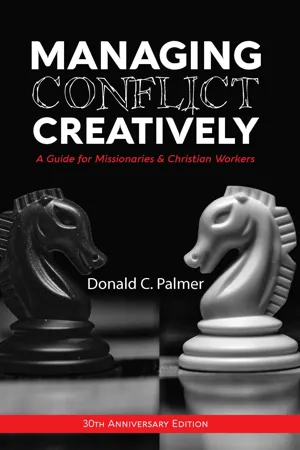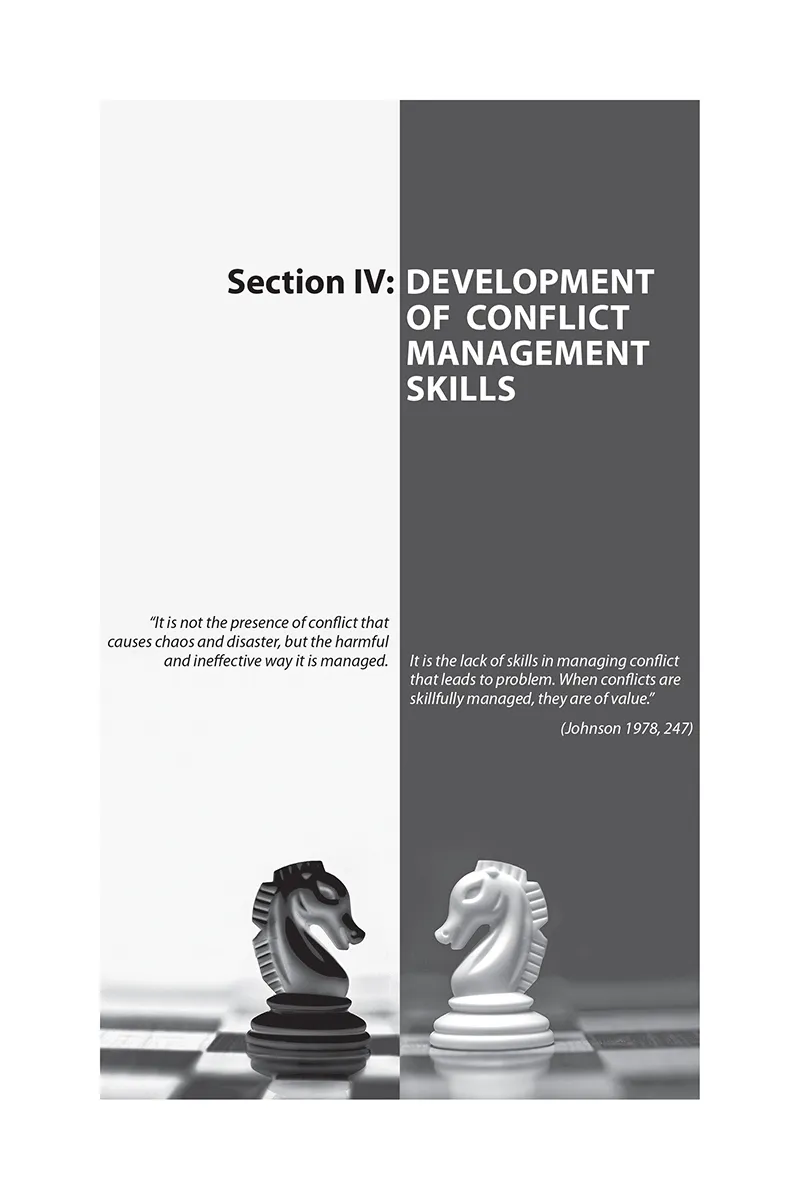![]()
By now our understanding of conflict has likely been changed significantly. We have learned about what causes conflict and whom it affects. We have considered both its constructive and destructive potential. Hopefully we have gained new insights into our own attitude towards conflict and the ways in which we react to it. And we have learned valuable lessons from Biblical accounts that describe how God’s people have handled conflict in the past.
We need to develop if we are to be effective conflict managers. As we have seen, conflict is a dynamic that can either wreak great havoc or that can lead to very positive results for an organization or group. Much depends on the knowledge, leadership, and skills that we can bring to this process. To aid us in developing these skills, in this chapter, we will learn:
• The stages through which conflict passes as it remains unresolved and becomes more changing.
• The importance of managing conflict as soon as possible, before it becomes more serious.
• The three essential elements in an effective conflict management strategy.
• The steps in the problem-solving process.
• The qualities of an effective referee/mediator.
I. LEARN THE STAGES IN THE CONFLICT CYCLE
As two or more parties try to have their own way, things are done or said that threaten the other’s territory. This causes reactions intended to protect that territory and to set things right. This sets in motion a cycle of feelings and behavior. As the conflict cycle progresses from one stage to another, tension mounts and actions become more destructive.
The conflict cycle is presented by Norm Shawchuck in his workbook, “How to Manage Conflict in the Church” (35-37). Understanding the cycle will enable us to determine how far a conflict has developed and how intense people’s feelings are. It helps us to answer the question, “What is happening here?”
If a conflict goes on for very long, the opposing parties will begin to shift their focus away from the real issues. They will become more concerned with defending themselves and with defeating the opposing party. All kinds of peripheral issues may surface at this time. We need to try to sort all of this out. Again, an understanding of the conflict cycle will help us to do this.
• Once begun, conflict follows a five-stage progression.
• The length of time for any stage may be very short or very long, but no stage is missed.
• The conflict may be resolved at any stage.
• The further a conflict progresses, the more difficult it will be to resolve in a positive way.
A. Tensions Development Stage
All conflict begins at this level. We can feel tension developing before a conflict comes out into the open, so we need to learn to listen to our senses. Tension signals that someone is feeling threatened or hurt, or is experiencing a sense of loss in some way.
At this point, people are not sure what is wrong and are embarrassed to say anything because the problem seems too insignificant. But it is at this stage that conflict is best handled since there is still a measure of trust and communication, and no great harm has been done to participants.
During this stage the conflict manager needs only basic skills. The effective mediator will take the initiative in getting the affected parties together so they can discuss the causes of tension and how the conflict can be resolved. This involves clearing up misunderstandings and negotiating an agreement. If conflict is not handled at this stage, it will move on to the next.
B. Role Confusion Stage
Here participants are confused about what is going on and are asking: “Who and what is causing this conflict?” “Am I part of the problem?” “What should I and others be doing to resolve this?” “What is my role and what behavior is expected of me in this conflict situation?” At this stage it is extremely important that the opposing parties be talking with one another, defining:
• The issue(s) involved.
• The changes or actions that have precipitated the conflict.
• The decisions or renegotiations that need to be made to resolve the conflict.
Unfortunately, communication often breaks down at this stage because now the issues seem very threatening and the participants are uncertain about how they were embarrassed to say anything, now the opposing parties feel threatened and avoid the conflict by breaking offcommunication with one another.
During this stage, the conflict manager will need role clarification skills. This involves the ability to help the participants in conflict to clarify their roles in starting the conflict and their responsibility for resolving it in a way that is acceptable to all parties.
C. Injustice Collecting Stage
This is the first really dangerous stage as participants begin to feel that matter can only get worse. Now the opposing parties begin to pull apart and prepare for battle. Every injustice and bad report, past or present, real or imagined, is collected to become a part of each one’s artillery.
It is also the name-calling stage as each party criticizes the other as being “stubborn,” “insensitive,” “unreasonable,” “unfair,” “unspiritual and carnal.” Opposing parties now expend their energies on attacking each other rather than on attacking the issues.
Since positive communication has now broken off between the opposing parties, it is vital that a mediator step in to manage the conflict. In addition to the previous skills mentioned, he will need:
1. The ability to be assertive with confidence and courage. This involves the skill to enable opposing parties to feel on an equal basis with each other. The leader must provide a cover of protection that will allow all parties to have freedom to express their views and concerns.
2. Spiritual authority and maturity. At this stage, a solution not only must resolve the original issue(s), but must also deal with resentments, suspicions, and harsh words and actions. The mediator may need to encourage apologies and forgiveness when these are called for. As Christian leaders, we must not underestimate the importance of confession and forgiveness when conflict has become negative and destructive.
D. Confrontation Stage
This is a very sensitive and potentially volatile stage as opposing parties now conflict one another. If poorly managed, each party will turn it into an occasion for justifying its own position, and for blaming their party for the conflict. It may even turn into a “fight” stage if reason is allowed to give way to anger, insults, and heated arguments.
On the other hand, if confrontation is well-managed, it can become an opportunity for participants to see how damaging the conflict has become and how important it is for them to clarify and resolve their differences. During the confrontation stage, the conflict mediator needs these skills:
1. The ability to monitor and to adjust tension. It is important for the mediator to know when to postpone and when to initiate confrontation. The latter is done by heightening tension to the point where everyone involved says, “We cannot go on this way. We have got to do something about this now.”
Here the mediator seeks to bring an unhealthy and persistent conflict to a crisis point where opponents are weary of fighting and are ready to look for a way out. Hopefully, they will now be prepared to give the time and energy it will take to enter into a process for resolving their differences.
2. The ability to keep confrontation within acceptable limits. Lasting hurts and emotional damage can result from poorly managed confrontation. It is important for the mediator to guide the confrontation process in such a way as to avoid lasting harm to the participants or to the larger organization. This means setting guidelines as to the kind of communication and behavior allowed. It also means steering participants away from actions intended to hurt others to actions aimed at resolving the conflict.
E. Adjustments Stage
Confrontation cannot continue on forever since it taxes those involved so heavily. As a result, the conflict parties look for ways to make adjustments to end the confrontation. The four main forms that adjustments can take are:
• To sever relationships with the other party. Each party goes its separate way. Missionary “causalities,” church splits, divorce, and dissolved partnerships are all a result of conflict poorly managed.
• To seek to dominate the other party. The “losers” will often become passive and discouraged and will have little motivation to carry out the decisions of the dominant party.
• To attempt to return to the way things were before. But because of changes that have taken place, this is seldom possible or desirable.
• To negotiate a new set of mutual agreements and commitments. This is the result of conflict well-managed.
The advantage that the conflict manager has in this stage is that the opposing parties are tired of fighting and are open to finding an agreement that will end the conflict. During this adjustment stage, a skilled mediator needs:
1. Creative thinking. He needs to open the participants’ minds to new alternatives and directions, concentration on solutions rather than problems.
2. Ability to gain the full participation of all parties. The adjustments and agreements made will be successful to the extent that everyone involved has had input in them.
The key consideration in understanding the conflict cycle is that conflict is dynamic. If not managed at one stage, it will move to the next. As it does so, emotions and tension increase, and the polarization of opposing parties becomes more pronounced.
If we are to be effective conflict managers, we must learn to recognize in which stage a conflict finds itself, and then use the skills and strategy that are appropriate for the situation. Where we lack the necessary skills, we should seek to develop them. This chapter is intended to help us understand and develop these skills.
II. MANAGE CONFLICT IN ITS FIRST STAGES
Conflict is inevitable, desirable, and constructive if handled properly. So, we do not want to do away with conflict itself. Rather, we want to turn it into a positive process rather than a negative one. To do this, nothing is more important for us than learning to manage conflict in its early stages. If this is the only lesson we learn in this section, it will be worth it!
In medical care, especially in the majority world, there has been an important shift of emphasis from “crisis” medical care to preventive medicine. In crisis care, doctors and nurses intervene when there is serious illness. But if the causes of the illness—contaminated water, lack of hygiene, malnutrition –are not dealt with, the same patients will return again and again for medical help. Preventive medicine, on the other hand, focuses on dealing with the root causes of people’s health problems. The result is that they will not have to keep coming back to medical personal for crisis care.
The same is true for conflict. We ought to place our major emphasis on dealing with it before it comes to a crisis point. In studying the conflict cycle, we have seen how important it is to manage conflict in the early stages. But what can we do to promote this as a regular practice on the mission field and in our churches and Christian organizations?
A. Establish a Structure and a...

